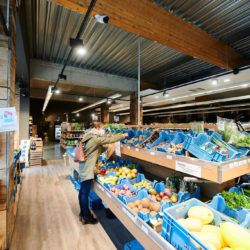Vous accompagner dans vos démarches BIO et durables, le cœur de notre métier d’organisme de certification
Nos labels et certifications BIO et durables
CERTISYS® est un organisme expert en certifications durables et pionnier de la certification biologique en Belgique depuis plus de 30 ans.
Forts de notre expertise, nous vous accompagnons dans vos démarches durables que vous soyez agriculteur, préparateur, distributeur…
Nous vous proposons des certifications adaptées à vos besoins garantissant et valorisant les meilleures pratiques sociales et environnementales : de nombreux systèmes officiels européens et internationaux de l’agriculture biologique (JAS, BIO Suisse, Canada Organic, NOP…) ainsi que des cahiers de charges privés dans le domaine de la cosmétique et des détergents (Ecogarantie®, Ecocert Ecodétergent…) et au Catering. Chez CERTISYS®, vous trouverez les certifications BIO et durables adaptées à vos besoins.
Des labels BIO et durables pour de multiples secteurs d’activité
Vous voulez vous engager dans la production ou la commercialisation de produits BIO et/durables ?
Vous cherchez de l’information spécifique à votre secteur d’activité ?
Il existe une grande variété de secteurs d’activité. La réalité terrain d’un agriculteur est différente de celle d’un préparateur, d’un point de vente, ou encore d’un importateur ou d’un opérateur qui travaille dans l’Horeca.
Parce que chaque secteur a ses propres spécificités au niveau des labels, des règles à suivre et des démarches à entreprendre pour se lancer en BIO, nous avons défini des secteurs d’activité pointus pour lesquels nous vous fournissons des informations détaillées qui ne sont propres qu’à votre activité.

Préparateurs
vous transformez des matières premières pour en faire des produits finis que vous vendez aux consommateurs, vous changez les conditionnements ou vous étiquetez à votre nom

Points de vente
vous vendez des produits, emballés ou en vrac, aux consommateurs sans les produire, les préparer ou les distribuer en B-to-B

Distributeurs
vous achetez et revendez des produits à d’autres entreprises, sans en modifier ni l’emballage ni l’étiquetage

Importateurs et Exportateurs depuis l’UE
vous importez des produits de pays hors UE ou vous exportez vos produits en dehors de l’UE

Cosmétiques et Nettoyage
vous fabriquez des produits cosmétiques ou des produits de nettoyage

Intrants et Matières premières
vous commercialisez des matières fertilisantes à des producteurs BIO

Catering
vous travaillez dans la restauration et vous utilisez des produits BIO en cuisine
À propos
de CERTISYS®
Active depuis 1980, CERTISYS® est le pionnier de la certification BIO en Belgique. Notre expertise et notre engagement 100% BIO et durable font de nous le leader sur le marché. Forts de cette expertise, nous vous accompagnons dans le développement de votre démarche BIO et/ou durable en Belgique, au Grand-Duché du Luxembourg. Grâce à CERTISYS®, vous pouvez également avoir accès aux marchés étrangers comme les USA, le Japon, le Canada, etc.
Nous sommes la filiale Bénélux du Groupe Ecocert, N°1 mondial de la certification biologique alimentaire et cosmétique. Le réseau international du Groupe nous permet de vous garantir la sécurisation de l’entièreté de votre filière.
A travers les activités du Groupe, nous pouvons également vous accompagner sur la formation et le conseil pour renforcer votre compréhension des enjeux et vos performances environnementales et sociétales.
Pourquoi choisir CERTISYS® ?

La force d’une expertise et d’un engagement 100% BIO et durable

Pionnier de la certification BIO et actif en Belgique depuis 40 ans

Un ancrage local : des contrôleurs locaux, qui connaissent votre terroir

Un service de qualité et la rigueur, au cœur de notre ADN

Plus qu’un organisme de certification, un partenaire en agriculture durable















